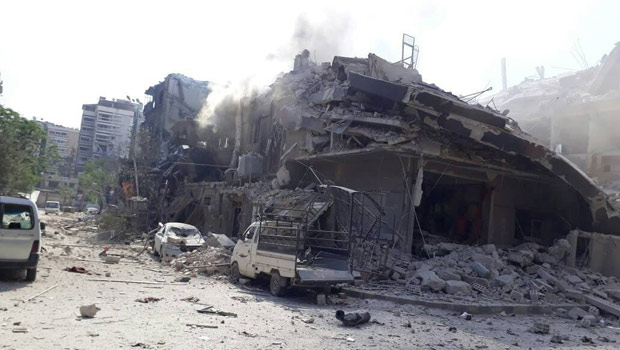The military strikes by the US, France and the UK against targets in Syria on Saturday did little to help protect Syrian civilians.
What is needed in Syria is a true commitment and strategy to protect Syrian civilians from the Assad regime’s campaign of war crimes and crimes against humanity and to come up with a common response to the crisis in Syria. It is high time to put the protection of civilians first.
The strikes targeted chemical production facilities in Syria following the 7 April chemical attack on Douma in Eastern Ghouta which killed at least 43 people and affected around 500 people. Saturday’s reaction was limited in scope and measures were taken to limit the risk of escalation of the conflict between international actors involved in the conflict in Syria.
Restoring international norms?
Because of the stalemate in the UN Security Council, the US, France and the UK claimed they had to act to restore international norms that prohibit the use of chemical weapons. The air strikes are however expected to have very little impact on that, given their one-time character and the lack of a follow up strategy. The self-proclaimed aim of restoring international norms is undermined by the fact that the coalition of 3 failed to take sufficient steps to legitimise their attack. They did not wait for the results of the OPCW mission that just arrived to Damascus, nor did they support efforts to install an investigation into attribution of chemical attacks initiated by the UN Secretary General. Their credibility is further undermined by their own double standards in the region. Only 2 weeks ago the US vetoed an impartial United Nations’ investigation into excessive violence in Gaza. And their complicity with war crimes in Yemen further undermine their credibility.
Impunity is the real problem
The focus on chemical weapons and the lack of action towards dozens of previous attacks with chemical weapons and numerous war crimes committed with conventional weapons in Syria raise doubts about the commitment to protect civilians. For seven years, Syrians have been imprisoned, tortured, raped, displaced, starved and killed on a massive scale. These crimes have until now been left with impunity. Today we see the disastrous consequences of that: At least half a million Syrians have been killed, half the population has been displaced, 13 million Syrians are in need of humanitarian aid and international norms have eroded. Western inaction has contributed to a situation in which any military act can lead to unintentional but uncontrollable escalation of violence in an already volatile region.
The war crimes committed in Eastern Ghouta are not limited to the use of chemical weapons. The offensive of the Assad regime on Eastern Ghouta, supported by Russia and Iran, has since February killed hundreds of people and forcibly displaced at least 133,000 people from the area, which has been under siege since 2013. This offensive has been part of the Assad regime’s “surrender or die” strategy, in which communities under opposition control are submitted to a series of war crimes, collectively punished, besieged, starved, bombed in order to force them to surrender and then be forcibly displaced. Given the systematic and large scale character of these war crimes they amount to crimes against humanity. Yet, they have been allowed to go on for years with impunity.
Use of chemical weapons has been systematic
The chemical attack of 7 April was not an isolated incident. Ever since the large sarin attack of 2013, the Assad regime has continued to use chemical weapons, in most cases chlorine, but in some cases also sarin, like last year in Khan Sheikhoun. The Khan Sheikhoun chemical attack let to a one-off retaliatory action by the US. Still, chemical attacks continued. The use of chemical weapons has been systematic throughout the Eastern Ghouta offensive. After heavy bombardments and bombing hospitals and civil defence centers out of service to make sure wounded could not be helped, the Assad regime used chlorine in different towns in Ghouta, to force the families hiding in basements out and to force the armed opposition groups in control of the area to surrender. And indeed, immediately after the Douma chemical attack, the surrender of Jaish al-Islam, the opposition armed group controlling Douma, was announced, and the first batch of busses came to deport people from Ghouta to the North of the country. Yesterday’s strike is unlikely to prevent this from happening again, as chlorine was used for the attacks, which is freely available due to its dual use.
Put protection of civilians first instead of geo-political interests
What has been blatantly missing over the past 7 years, and is still missing in the military strikes by the US, France and the UK, is a true commitment and strategy to protect Syrian civilians from the Assad regime’s campaign of war crimes and crimes against humanity and to to come up with a common response to the crisis in Syria. It is high time that instead of geo-political interests, the protection of civilians is put first. Rather than a symbolic military attack, the international community should develop a comprehensive strategy, to finally protect civilians in Syria, end impunity, promote justice and accountability and counter double standards when it comes to international norms. If the pattern of the Assad regime’s “surrender or die” strategy is not broken through such a comprehensive strategy, other areas will follow the fate of Eastern Ghouta and more war crimes and crimes against humanity will be committed.
Read also: The War in Syria – 5 questions about Ghouta




